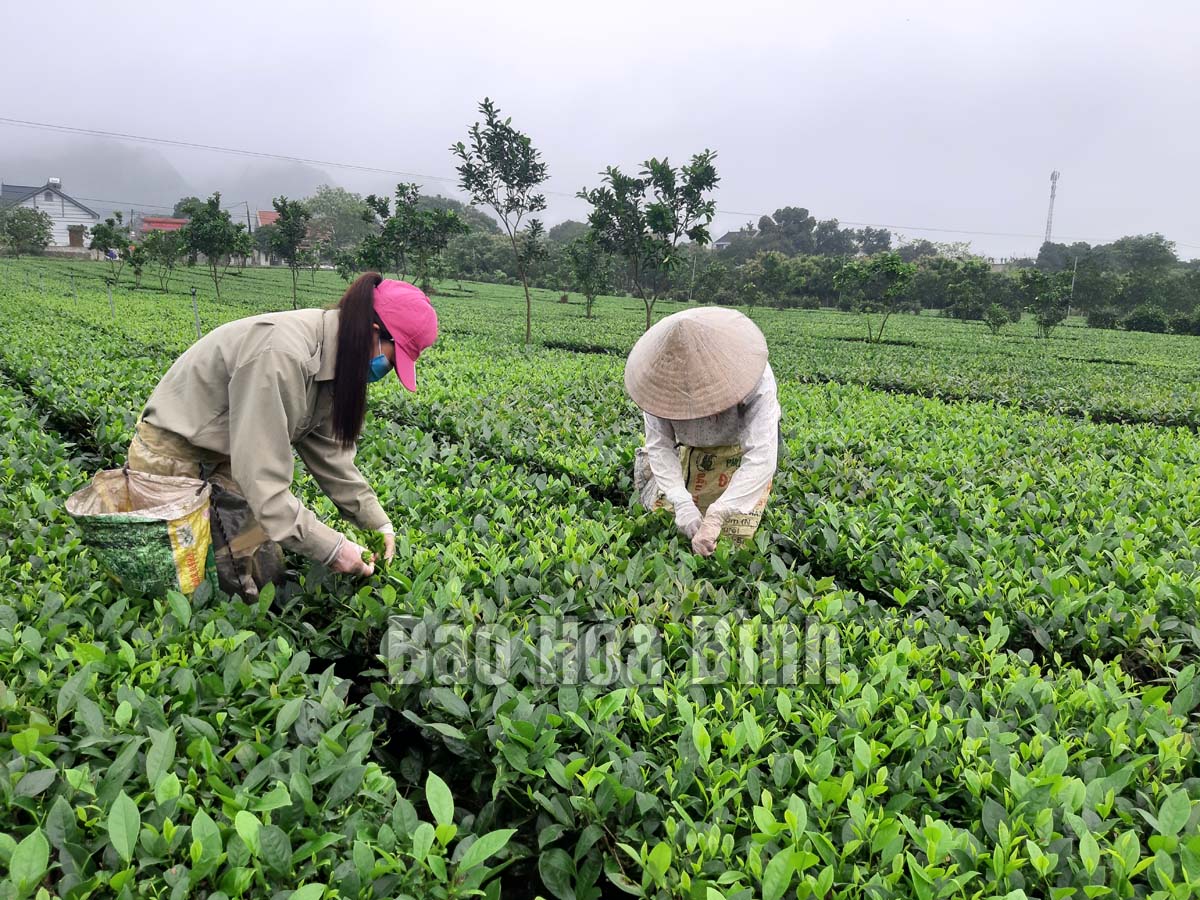
(HBO) - Green economic development is a sustainable step, an inevitable trend of the current and future economy. This trend has been proven through the reality of developed countries in the world and some provinces and cities in the country. For the first time, the goal of green and greener development is a consistent stance covering all fields defined in the Resolution of the 17th provincial Party Congress in the 2020 – 2025 tenure.

Farmers in Phu Thanh
commune (Lac Thuy) produce tea following safety standards.
In recent years, green economy is an inevitable trend in the
development process of many countries and many localities in Vietnam. Green
economy means a combination of three factors: economy - society - environment.
The green economy which has a sustainable nature is activities creating profits
or beneficial values, towards the life development of the social community and
people.
Hoa Binh, adjacent to Hanoi, is located in the development
planning of the capital area. The province has a "clean" landscape,
environment, and cultural identity that have not been affected much by economic
development activities. According to businesses, investors and experts,
potential for development of the province remains big if it knows how to bring
into full play these advantages.
Resolutions, action programmes, and projects to implement
the Resolution of the 17th provincial Party Congress have shown a consistent
view of realising green and greener development so that every citizen can enjoy
the fruits of innovation. The province is urgently preparing a provincial
planning with a vision to 2050, aiming to become the leading province in the
Northwest region, with the principle that planning must be consistent with the
province's green and sustainable development orientation.
In the coming years, the province strives to complete a
network of synchronous and modern socio-economic infrastructure, with focus on
prioritising the development of road transport infrastructure and technical
infrastructure to protect the environment and respond to climate change.
Attention will be paid to stepping up ecological urban development, reducing
the exploitation of stone to create ecological space for urban development,
strengthening the preservation of national cultural identity.
Hoa Binh will also develop agriculture in the direction of
concentrated commodity production and linking with processing industry,
tourism, and environmental protection; while promoting the application of
high-tech agriculture, biotechnology and organic agriculture; and developing
environmentally-friendly industries with high technology content, and
encouraging the development of industries serving agriculture and rural
areas.
Hoa Binh province is undergoing a dynamic transformation amid Vietnam’s national digital transition. Building on Poliburo’s Resolution No. 57-NQ/TW on breakthroughs in science, technology, innovation, and national digital transformation, the province has rolled out a wide range of practical action plans. A standout initiative is the "Digital Literacy for All” movement, an effort to ensure that no one is left behind in the digital era.
Hoa Binh province is undergoing a dynamic transformation in the wake of the national digital transformation movement. Building on Resolution No. 57-NQ/TW of the Politburo on breakthroughs in science, technology, innovation, and national digital transformation, the province has implemented a wide range of practical action plans. A standout initiative is the "Digital Literacy for All” movement ambitious effort to ensure that no one is left behind in the digital age.
With a spirit of unity and proactive problem-solving, the Party Committee, the government and the people of Dong Lai Commune (Tan Lac District) have made great strides in implementing the resolutions of the 24th Party Congress of the commune for the 2020 - 2025 term. Focusing on leadership and practical actions, the commune has brought the Party’s resolutions into daily life, creating strong impacts and pushing the local development forward.
Amid the nationwide push for digital transformation, young people in Hoa Binh Province are stepping up as dynamic pioneers, applying technology to enhance Youth Union operations and expand the reach of youth-led initiatives. Through creativity and adaptability, Youth Union organizations at all levels have introduced a series of practical solutions, contributing to modern governance and community development.
In recent years, An Nghia commune, located in Lac Son district, has stepped up administrative reform, focusing on improving the quality and efficiency of its single-window service unit for receiving and processing administrative procedures. These improvements have helped create favourable conditions for local residents and organisations to handle administrative procedures, contributing to the commune’s broader socio-economic development.
The Prime Minister-approved master plan to develop the multi-use value of forests ecosystems through 2030, with a vision to 2050, aims to improve the management and sustainable use of forest resources, create jobs, increase incomes, and improve the living standards of ethnic minorities, people in mountainous and remote areas, forest workers and those living near forests.



